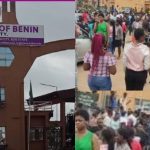Kwara State Government has said that plans have been concluded to mobilise military personnel and other security logistics in identified locations where cases of security challenges have recently been recorded in its planned Measles-Rubella immunisation campaign.
It be recalled that activities of suspected bandits and kidnappers were being recorded in some parts of the state, like Kwara South and Kwara North, in recent times, while the state government had engaged local and federal government assistance to tackle the situation.
Speaking at a one-day sensitisation programme for media practitioners in Kwara on the integrated Polio-Measles Rubella immunisation campaign, the executive secretary of the state Primary Health Care Development Agency (KPHCDA), Professor Nusirat Elelu, said that the campaign, planned to hold between October 11 and 20, 2025, would take place across 16 local government areas of the state.
ALSO READ: Ondo govt disburses N38m to offset medical bills of 39 residents
Represented by the director, Primary Health Care System, Dr. Michael Oguntoye, said that the immunisation campaign is in line with global targets of Measles-Rubella elimination by 2030.
“We are committed to mobilising military personnel, health officers, and necessary logistics to areas witnessing insecurity. Because we need to protect the health of the people, too. We won’t want to make it a double tragedy for them in not getting immunised and being faced with a security challenge.
“We’ve opened discussion with the National Emergency Operation Centre of the National Primary Health Care Development Agency and the military on the best strategy to use to ensure that the areas experiencing security challenge have access to the vaccine. So, no community will be abandoned,” he said.
In their goodwill messages, the representatives of the United Nations Children’s Fund (UNICEF), the World Health Organisation (WHO), among other development partners, allayed the fears of the people on the Measles-Rubella vaccine, saying that the immunisation exercise is not a plan to reduce the nation’s population.
The development partners said that the Measles-Rubella injection does not cause infertility, adding that children not immunised are prone to paralysis and deafness, among other diseases.
In his address, the United Nations Children’s Fund (UNICEF) representative, Ibrahim Mohammed, said that Nigeria accounts for about 50 per cent of Measles and Rubella cases in Africa, adding that the introduction of the vaccine will protect communities, especially children, against Measles-Rubella diseases and reduce outbreaks by providing immunity.
The UNICEF official, who said that the current campaign targets children between nine months and 14 years, added that immunisation targets the children because they are the most vulnerable.
“We have made remarkable progress in the fight against preventable diseases. We all stood tall as Nigeria was declared free of wild poliovirus, united by a single mission: to protect our children and communities from preventable diseases through vaccination.
“For decades, measles has been one of the leading killers of children under five years. Rubella, though less well known, causes lifelong harm when it infects pregnant women and children. With the introduction of the Measles-Rubella (MR) vaccine, we now have an additional, powerful tool to stop both of these diseases and protect generations yet unborn.
“The Measles-Rubella (MR) vaccine is safe, paid for by the government, and available for all eligible children (9 months-14 years) at no additional charge.
“It is concerning that Nigeria has one of the highest numbers of zero dose children in the world. This means that measles outbreaks still claim young lives. Rubella continues to threaten unborn children, and there is continuing spread of the variant poliovirus in the country. Remember, vaccine is only effective when it reaches every child,” he said.
The UNICEF official called in the media to assist in the campaign, saying that the media has a critical role to play.
“Your voice can break down myths and misinformation. Your platforms can build trust in science and public health. The stories we choose to share can make vaccination not just a medical necessity but an honorable parental duty and a community value proudly upheld”.
WATCH TOP VIDEOS FROM NIGERIAN TRIBUNE TV













